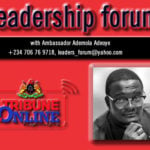EXCEPT for members of the political class holding nocturnal meetings and a few compatriots engaged in other activities last Friday night, most Nigerians woke up on Saturday expecting to cast their votes for their preferred presidential, Senate and House of Representatives candidates in this year’s general election. Alas, it was only a dream as, citing logistic hitches, the Professor Mahmood Yakubu-led Independent National Electoral Commission (INEC), in the dead of night, had announced the postponement of the elections to Saturday, February 23. In taking the unexpected action, the commission said that “the one-week adjustment was a painful one but necessary in the overall interest of our democracy.” It noted that it was unable to deliver materials to some locations due to bad weather and had therefore relied on slow-moving long haulage vehicles to locations that could be serviced by air, even though it had created five zonal airport hubs to facilitate the delivery of election materials. Apart from these challenges, it averred, it also faced possible sabotage, namely fire incidents in some of its offices across the country.
General election: Those who will cause trouble will see trouble, TB Joshua warns
Expectedly, the commission’s decision was greeted with outrage and umbrage both locally and internationally, with the major political parties purveying conspiracy theories. The country being currently the global poverty capital with 91 million citizens trapped in misery, it was quite understandable that Nigerians, many of whom had travelled long distances in order to exercise their franchise and were in no position to stay for an additional week at their polling units by virtue of financial and economic reasons, would vent their spleen on the commission and the government of the day. Indeed, in its assessment, the Lagos Chamber of Commerce and Industry (LCCI) estimated that the country lost about $1.5 billion to the election postponement. In their own reaction, the European Union Election Observation Mission, Economic Community of West African States Election Observation Mission and other election observers asked the commission to finalise preparations and adhere strictly to the February 23 date. Noting that the suspension of the polls had caused disappointment for many, they admonished the commission to provide regular updates and information to the public on its preparations in the coming days and weeks to enhance confidence and trust in the electoral process.
To all intents and purposes, last Saturday’s event cast the country in very bad light. It portrayed it as unserious and its governance and institutions weak, ineffective and fraudulent. Indeed, the excuses given by the electoral commission are rather tendentious and facile. Elections anywhere in the world face challenges, but countries that want to be taken seriously keep their word. On current evidence, INEC and the current administration failed the country last Saturday and must carry the can. The commission having been apparently well funded by the National Assembly, it was up to it to approach the elections proactively and innovatively. Truth be told, it failed the country and, what is more, that failure was accentuated by the rather cavalier apology in the statement it issued to the public.
The foregoing notwithstanding, the point must be made that Nigerians and indeed the international community will accept no excuses on Saturday. The commission must therefore step up its game and demonstrate that it did not spend the last four years preparing for nothing. To say the least, hardly anybody is impressed by the assurances it has been dishing out to the public following last Saturday’s failure, and it is time to tackle the problems it identified head on. If there is any truth to the claim its operations are bogged down by undue centralisation, it is time to make decisive changes. In any case, it did not exactly cover itself in glory with the treatment of its ad hoc staff, many of whom spent the night in appalling conditions last week, without pay and without dignity. Happily, though, it has another opportunity to put all the infractions behind it.
On the other hand, we reiterate that politicians must play by the rules and not set the country on fire through ethnically and religiously inflammatory utterances. There was Nigeria before now and there will be long after they exit the political stage and there is no reason for them to orchestrate anarchy in order to actualise their political ambitions. And if the security agencies were well prepared for the postponed February 16 election, it is time to be even better prepared for Saturday’s election. They must demonstrate loyalty to the country and its constitution in their activities. They must be professional, courteous and proactive. On their part, stakeholders like the media, election observers and indeed the voters themselves must conduct themselves with decorum on Saturday. It is time to move the country forward.





